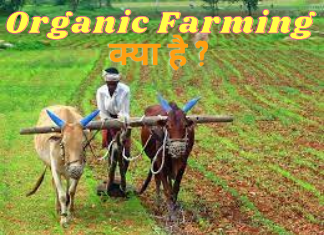If the word is agriculture, then you must have heard and you must have known what is agriculture. Agriculture is called agriculture or farming in Hindi. When you are biling from a remote village, then you must have seen agriculture very closely.
What is agriculture, if you are from a town, then you must have felt the agriculture, the variety of dishes that you have in your plate and all the different kinds of vegetables, all of them are due to agriculture.
what is organic farming in india
There is another term related to agriculture which is called organic agriculture which has taught us agriculture without harming nature, humans and animals.
In order to pacify your curiosity related to organic agriculture, we have brought this article in full detail for you.
What is organic agriculture
So before we know what is organic agriculture, we know what is this organic agriculture. In these organic agriculture, farmers use more chemical fertilizers and pesticides in the greed of higher yield.
This increases the yield, but these organic agriculture reduces the quality of the crop, reduces the fertility power of the soil and these organic agriculture also have a bad effect on our eco-system.
Now come back to our original question: Organic Agriculture: These organic agriculture is reversed. Organic agriculture does not use any chemical fertilizers or pesticides.
Cow dung, urine, compost manure, organic manure, vermicomposting and green manure are used in it, they do not have any bad effect on nature.
That is why organic agriculture is very eco-friendly, it also improves the yield quality and this type of food is very beneficial for our health.
Today, the whole world is promoting organic agriculture, people are again abandoning these organic agriculture and adopting organic agriculture and protecting the present generation from future ill effects of chemical fertilizers.
Now there is a question in your mind that why the whole world is shifting from these organic to organic, try to understand this question in the context of India.
After independence, Indian agriculture was not in very good condition, India’s grain storage was reduced in the 60s, the situation is such that grains were imported from some foreign countries.
In order to avoid this formidable crisis, the Green Revolution was brought in India.
With the advent of the Green Revolution, Indian agriculture was transformed, now new machinery systems resources were being used in agriculture, along with this, many types of artificial fertilizer were also used for higher yields in the fields.
The Green Revolution had a huge impact on Indian agriculture, doubling the production of wheat and rice production and India soon got out of the problem of grains.
And due to the Green Revolution, India has become self-sufficient in the matter of food grains, but it is said that the thing which is a boon for us sometimes becomes a curse.
Something similar happened that after the Green Revolution, the earth started to become toxic due to the excessive use of chemical fertilizers, due to more irrigation, the ground water level went down in many places.
The stalks of plants from these organic agriculture began to be used by the farmers as four, which also had a greater impact on the health of the animals.
The beneficial kits that were sprayed with pesticides also started disappearing, this greatly affected our ecosystem, due to all this, the emphasis was on organic agriculture and today the situation is that the whole world is shifting towards organic agriculture.
Organic Agriculture Benefits
Now we know what are the advantages of organic agriculture
1 – Firstly, the biggest benefit of organic food is that organic food does not contain any harmful chemical elements which are very beneficial for human health.
2 – Organic agriculture greatly benefits the farmers at an economical level; Organic food is sold at double the price and its demand in the market also remains.
For example, organic wheat 40 to ₹ 45 kg, mustard organic oil is sold for around ₹ 200, which is twice the common name.
3 – The use of organic manure increases the fertilizer power of the soil, which increases the yield.
4 – Organic farming does not require much water for irrigation, which increases the underground water table.
5 – Compost manure, vermicomposting is used for composting and waste is used in compost compost, which reduces the diseases.
6 – Due to the nominal use of chemical fertilizer, the cost is reduced which causes less burden on the pockets of the farmers.
History of Organic Agriculture
So after all this, we now know a little history of organic agriculture, all the traditional methods of farming were organic.
Because the people of earlier times did not have any organic method of farming, hence the history of organic agriculture is in a way the history of agriculture itself.
These organic agriculture was visited just for a few breaks in between, again governments around the world are promoting organic agriculture and many NGOs are also working in the area.
And he trains the farmers and there is increasing awareness among the farmers about organic agriculture.
Today, YouTube also has a success story of many farmers who are earning millions from organic agriculture and remain a source of inspiration for the rest of the farmers.
What is the status of organic agriculture in which country
Although today a positive wave of organic agriculture has run in the whole world, but many countries are far ahead in this race, so many countries are still far behind in this race.
According to the 2018 report of the Research Institute of Organic Agriculture, Australia, Argentina, China and the United States have the highest organic land.
To support organic agriculture in India too, the Government of India has launched a traditional agricultural development scheme aimed at accelerating the domestic production and certification of organic products involving farmers.
Along with this, there is a lot of emphasis on organic agriculture in the continents of Asia, Europe, Africa etc.
By the way, you must now understand what is organic agriculture and what are the advantages of organic agriculture, what is its history and how is the world reacting to it.
After all this, we hope that you have got all the information related to organic agriculture and would have liked it too.
Nowadays people have started growing vegetables and all other things at home, if they talk about organic agriculture, they eat the homely food they eat, in a small way, the organic agriculture people are adopting at home.
By the way, you will get all the information on how this happens on the internet, so nowadays many people are working in this direction and if you also want to work in this direction, then our best wishes are with you.
Along with this, this information is what is organic farming in India, how can you share it with us by writing in the comment box, and what you want to know about it further, by writing it in the comment box, we will definitely try your information. Please provide.

